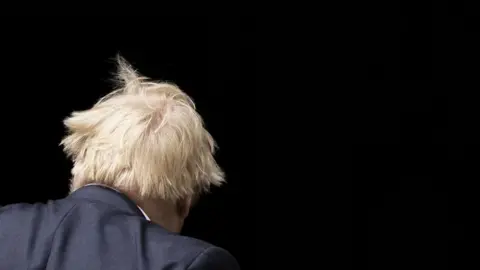How might Boris Johnson be removed as PM?
 Getty Images
Getty ImagesAfter a wave of high profile resignations, Number 10 will be keen to say they have stabilised the ship - there is a new chancellor, with a new approach, a new health secretary and a new education secretary.
One of Boris Johnson's allies claimed that Rishi Sunak and Sajid Javid had failed to "tap up" support from other cabinet ministers, before announcing their resignations on Tuesday evening, although one more minister has yet to make his intentions clear.
The PM's ally says he will weather this storm - but the political waters remain very choppy.
Some of Mr Johnson's Conservative critics - including still-serving ministers - think he is holed beneath the water line.
If - and I stress if - his premiership does go under, how might it happen?
Further resignations
The first possibility is that more resignations follow in the coming days.
Already the number of junior ministers departing is beginning to pile up, including at least a few unexpected names, keeping up pressure on the prime minister.
But Downing Street insist they have factored in some further resignations and don't regard these as an existential threat.
The tipping point - where there aren't enough people to fill available posts - is still some way off.
But not all of those who haven't quit are loyal to the prime minister.
While remaining publicly supportive, it's possible that some ministers will be privately asking the PM to consider his position.
If - as seems likely - he refuses to do so, this could provoke further departures, with one minister telling me they'd go if the PM tries to stay on until the summer recess.
And some leadership hopefuls might just get nervous that Rishi Sunak will make all the running if they don't at some point distance themselves from No 10 too.
For example, one minister said that newly-appointed Chancellor Nadhim Zahawi had been seen as a credible leadership candidate, but he had now "contaminated himself".
Another confidence vote
Assuming the PM digs in, then next week's elections to the backbench 1922 committee could prove crucial.
If MPs standing on a platform of changing the leadership rules form a majority, it's a moment of jeopardy for Boris Johnson.
The PM survived a confidence vote last month and under current rules he is immune from another challenge for 12 months.
Rebel MPs are attempting to get elected on to the committee to change that rule to allow a further confidence vote.
It had been anticipated that the rules could be changed to allow another vote within a year, but that it would not take place until the Autumn, after the Privileges Committee pronounces on whether the PM had deliberately misled Parliament.
But there is now some talk of calling a confidence vote much sooner with some people putting a timescale on this: within 24 hours of the rules changing, or certainly within days.
And in fact if they felt the mood had changed significantly against the prime minister, the existing executive could also change the rules, even sooner, possibly this week.
If Boris Johnson were to be defeated in a confidence vote, then nominations would be open for a new leader - with MPs potentially whittling the candidates down to the final two before the summer recess.
And what is striking is that I have spoken to a number of Conservative MPs who backed Boris Johnson in the last confidence vote, who would not support him in the next one. This includes an MP who prominently supported him in the last leadership contest.
As one Brexit and former Boris backer put it: "This can only go one way. I don't want this to go on until the Autumn."
Snap election
So another possibility has been raised.
The chairman of the 1922 committee, Sir Graham Brady, could go to No 10 with - metaphorically - a pile of no confidence letters under his arm. He tells the PM the leadership rules will change, in this scenario, and that he will lose any subsequent vote, so perhaps he should leave the premises before being forced to do so.
Now, Boris Johnson - having scrapped the Fixed Term Parliaments Act - could respond by going to Buckingham Palace to seek a dissolution of parliament and a general election.
No one in Downing Street has suggested to me that this is a possibility, but there is plenty of concerned chatter in and around Parliament.
Westminster is, of course, nothing if not a hotbed of speculation.
And Boris Johnson has, Houdini-like, escaped from tight political spots before.
Though, ultimately, it did not end well for the legendary escapologist.
